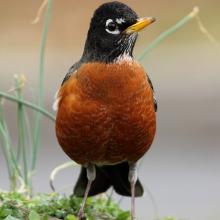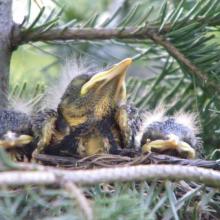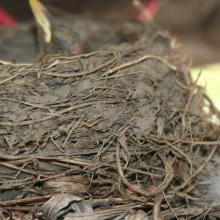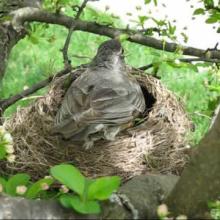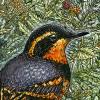

Join BirdNote tomorrow, November 30th!
Illustrator David Sibley and actor H. Jon Benjamin will face off in the bird illustration battle of the century during BirdNote's Year-end Celebration and Auction!
Some birds have always called nocturnally, but other species are relative newcomers to the nighttime music scene, specifically in urban areas. Birds such as American Robins often sing well into the night. Scientists are studying what environmental cues might lead to this behavior. While artificial light could be a factor, recent studies suggest that some birds may be avoiding daytime city noise by singing nocturnally.
Birdnote®
Singing Under Streetlights
Written by Conor Gearin
This is BirdNote.
Some birds have always called nocturnally, such as nightjars, mockingbirds and owls.
[Eastern Screech-Owl call, ML 168804731, 0:26-0:27]
But other species are relative newcomers to the nighttime music scene, especially in urban areas.
[start jazz acoustic bass]
In cities in the U.S., some American Robins put on a show long before sunrise.
[American Robin song, ML 321642131, 0:06-0:09]
Researchers are studying why certain songbirds sing nocturnally in cities. Some studies suggest that artificial lighting from street lamps and buildings could lead birds to treat the night like the day. However, some experiments with artificial lights showed no effect on singing behavior. For some birds it seems that noise is an important factor.
[passing car sfx]
A study in the United Kingdom found that European Robins in noisier environments tend to sing at night. The finding suggests that these robins experience nighttime as the best time to have their voice heard by potential mates and rivals, after the day’s hustle and bustle.
[European Robin song, ML 313142671, 0:19-0:21]
Whatever the cause, birds singing at night are one more thing, like rumbling trains and passing cars, that city-dwellers learn to sleep through.
[American Robin song, ML 321642131, 0:03-0:06]
For BirdNote, I’m Michael Stein.
###
Senior Producer: John Kessler
Production Manager: Allison Wilson
Producer: Mark Bramhill
Associate Producer: Ellen Blackstone
Digital Producer: Conor Gearin
Bird sounds provided by The Macaulay Library of Natural Sounds at the Cornell Lab of Ornithology, Ithaca, New York. American Robin ML 321642131 recorded by T. Sturm, European Robin ML 313142671 recorded by L. Schofield, and Eastern Screech-Owl ML 168804731 recorded by W. Hershberger.
BirdNote’s theme was composed and played by Nancy Rumbel and John Kessler.
© 2021 BirdNote November 2021 Narrator: Michael Stein
ID# song-16-2021-11-23 song-16
References
https://academic.oup.com/condor/article/108/1/130/5563689?login=true
https://royalsocietypublishing.org/doi/abs/10.1098/rsbl.2007.0134
https://royalsocietypublishing.org/doi/pdf/10.1098/rsos.160231
https://royalsocietypublishing.org/doi/full/10.1098/rsos.160638




